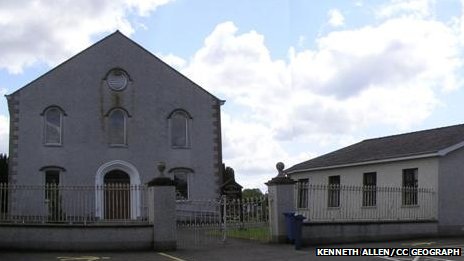 Yesterday the Ulster History Circle unveiled a Blue Plaque at Aghadowey Presbyterian Church in honour of Rev. James McGregor. Aghadowey Presbyterian Church was founded in 1655 making it one of the oldest congregations west of the Bann. It also has amongst the largest Presbyterian church buildings in County Londonderry.
Yesterday the Ulster History Circle unveiled a Blue Plaque at Aghadowey Presbyterian Church in honour of Rev. James McGregor. Aghadowey Presbyterian Church was founded in 1655 making it one of the oldest congregations west of the Bann. It also has amongst the largest Presbyterian church buildings in County Londonderry.
Rev. James McGregor was a veteran of the siege of Derry where he is purported by some to have been the first to see the relieving ships. He became minister of Aghadowey in 1701 where he preached (in Ulster Irish as well as English) until in 1718 he left for the New World. There his congregation were initially not welcomed by the Puritan settlers of Boston. As such they moved to Nutfield, New Hampshire which, in 1722, was renamed Londonderry. McGregor’s settlers are reputed to have been the first to introduce the potato to North America.
From the Promotional Leaflet (I believe from ulsterhistory.co.uk but not on their website yet) and kindly provided by Agahdowey minister Rev. Dr. Robert Kane:
McGregor delivered a sermon in Coleraine before he left in which he said that his congregation was leaving Ulster “to avoid oppression and cruel bondage, to shun persecution and designed ruin…and have an opportunity of worshiping God according to the dictates of conscience and rules of His Inspired Word”
McGregor over wintered at Dracut, Mass. and linked, up in spring with other settlers from the Bann Valley who had travelled overland from Maine to a place in New Hampshire called Nutfield. In April 1719 he became the pastor and leader of what was, the first Ulster Presbyterian settlement in America. Nutlield took its name from an abundance of chestnuts, butternuts and walnuts, but the area was disputed between Massachusetts and New Hampshire, and the Ulster settlers were accused of being ‘poor Irish’ and Roman Catholics. McGregor petitioned the Governor of Massachusetts in 1720, saying: “We were surprised to hear our Selves termed Irish People when we so frequently ventured our all for the British Crown and Liberties against the Irish papists”. In 1722 a grant was made for a town, which was then given the name Londonderry, in recognition of the place in Ulster to which many of the settlers felt an attachment.
From the News Letter:
He (McGregor) preached in the Irish language for many years but in 1718 – when the effects of the religious persecution of non-Anglicans, bad harvests and soaring rents caused great hardship – he led up to 1,000 immigrants on to five ships bound for Boston, America.
The new arrivals were not welcomed by the English settlers already there so Rev McGregor led his flock to Nutfield, New Hampshire where they founded the first Ulster Presbyterian settlement on the continent.
The plaque commemorating the achievements of the pioneering minister was unveiled yesterday at Aghadowey Presbyterian by the US Consul General for Northern Ireland, Gregory S Burton, and the current clergyman Rev Robert Kane.
Rev McGregor is reputed to have brought the potato to America where it was cultivated by the new settlers and, having put down roots at Nutfield, the Ulster-born congregation members were granted permission in 1722 to change the town’s name to Londonderry.
The Blue Plaque tribute is the result of collaboration between the Ulster History Circle and the Ulster-Scots Agency.
Author and historian Rick Holmes and his wife travelled to Aghadowey from Londonderry, New Hampshire for the unveiling,
Ulster History Circle chairman Chris Spur described James McGregor as a “man who saw and made history”.
Mr Spur said: “In the Siege of 1689, he is believed to have signalled the relief of Derry; in 1718 he led the great migration, and in 1722 he founded Londonderry. The ‘Moses of the Scots-Irish’ brought his people to a new beginning.”
Ian Crozier, CEO of the Ulster-Scots Agency, said “The Ulster-Scots Agency is delighted to be able to highlight the contribution to another Ulster-Scot who has made a huge difference to the religious landscape of New England and global Ulster-Scots diaspora.”
There was also a talk by local historian Mr. George Dallas and a display of memorabilia. Glenkeen Band provided the music and a large model of one of the ships (the William and Mary) was present. Previously the model was in the procession the last time the 12th of July was in Garvagh.
This author has not written a biography and will not be writing one.
Discover more from Slugger O'Toole
Subscribe to get the latest posts to your email.